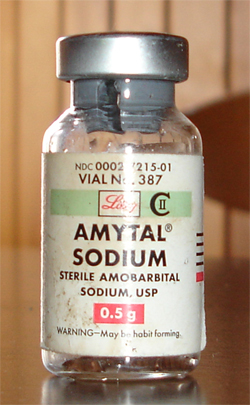
A Colorado judge has approved the involuntary administration of a “truth serum” to Aurora shooter James Holmes should he plead not guilty by reason of insanity to charges related to last year’s shooting rampage at a movie theater. Holmes is charged with 166 counts, including murder, attempted murder and other charges for the July 20 incident, which left 12 people dead and 58 wounded by gunfire.
The court has not released the name of the drug to be used, but it would most likely be sodium amobarbital, also known as sodium amytal, or another short-acting barbituate.
Narcoanalytic interviews, as they are known, involve putting the witness on an intravenous drip of the drug until he or she shows signs of impairment such as slurred speech. The interviewer begins with simple questions such as the witness’s name before progressing to questions related to the crime at hand.
The drug works by lowering the witness’s inhibitions, and can be effective in eliciting information, but not reliably. Some patients will continue to lie. Some become increasingly susceptible to suggestion. Some fall asleep or become too punchy to be reliable. The treatment has been used in relation to insanity pleas before, though generally at the request of the defendant and to prove rather than disprove insanity. Most experimentation involves trying to elicit repressed or forgotten memories.
William Shepherd, chair of the criminal justice section of the American Bar Association, has said that the use of such a treatment to ascertain the truth of an insanity plea is highly unusual, according to The Guardian, and would likely provoke intense argument protecting Holmes’s right to remain silent under the Fifth Amendment.
CLBB co-director Judith Edersheim suggests that the Fifth Amendment argument is only one of many challenges that prosecution would have to overcome to use such testimony as evidence. “There is a telephone book worth of reasons why this maneuver might not withstand threshold constitutional challenges,” says Dr. Edersheim. In addition to the Fifth Amendment concerns, she says, is the question of whether Holmes’s memories might be considered “biological products,” the obtaining of which might violate the protection against unreasonable searches and seizures granted in the Fourth Amendment. Compelling this examination might be considered government conduct which “shocks the conscience” in violation of the 14th Amendment due process clause.
Questions about the reliability of the drug for the purposes of this case would likely also provoke extensive challenges from the defense regarding any obtained testimony’s validity and admissibility, delaying the trial.
Furthermore, says Dr. Edersheim, “The judge is opening up a whole host of issues—evidentiary, constitutional, and psychiatric—which are unnecessary.” Even if Holmes alleges that he has forgotten the events, the drug is unreliable when used to unearth suppressed memories. “If he asserts insanity, diminished capacity, or diminished responsibility—and the prosecution claims he is malingering or lying – there are superior and less controversial tried-and-true methods for detecting this with traditional forensic psychiatric evaluations and psychometric tests devised to ferret out lying.”
Paul A. Spiers, a Forensic Neuropsychologist and Assistant Professor in Behavioral Sciences at Boston University, believes that the use of the drug can be very successful. Spiers, along with colleague Paul Hardy, developed a procedure which paired progressive infusion of sodium amobarbitol with more sophisticated physiological monitoring (computerized biofeedback monitoring) and the interview format that authorities regularly use for lie detectors. The procedure has been used in several high-profile cases in Massachusetts, and Spiers considered volunteering to administer the test to Holmes after Holmes claimed dissociative amnesia.
“If you have never interviewed someone on truth serum, it is truly remarkable,” Spiers says. “I don’t see then how exponentially increasing the power of polygraph”—which, he points out, was also inadmissible for many years—”by adding amytal can be ruled out for much longer. Memory is, of course, reconstructed and may be unreliable when induced this way, but if the memories correspond with the facts of the case and help to explain it, then the amytal may just disinhibit the temporolimbic network allowing it to make the proper synaptic connections to access those memories.”



